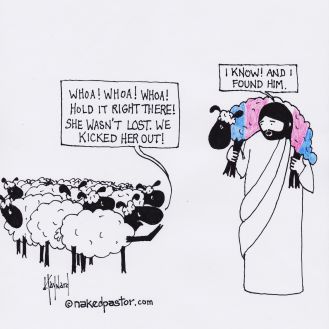Escaping the Cruelty of the Flock: Rethinking the Parable of the Lost Sheep

Sister Luisa Derouen, OP
Today’s post is from guest contributor Sr. Luisa Derouen. Sr. Luisa is a Dominican Sister of Peace who began to minister among the transgender community in 1999 and has been a spiritual companion formally and informally to about 250 transgender people across the country. She is now semiretired at the St. Catharine Motherhouse in central Kentucky.
Today’s liturgical readings for the 24rd Sunday of Ordinary Time can be found here.
I awoke late one night to my phone ringing. It was Shane, a young trans man who loved his Catholic faith, but had stopped going to church because he felt targeted and rejected. He was sobbing. He kept saying, “I miss going to Mass and I miss receiving Holy Communion! But I can’t go back to church because I’m not safe there. The Catholic Church doesn’t want me.”
In another moment, a trans woman turned to the obituaries in the morning paper. She saw that someone in her immediate family had died. She had been totally rejected by her family, and to her shock, saw that she was listed (in her previous male name) as having preceded this person in death! I can’t imagine what it would feel like for my family to disown me to the extent of publicly naming me as dead.
Today’s Gospel from Luke’s well-known chapter 15—the parables of a lost sheep, a lost coin, and a lost son—is what brought these memories to mind for me. The parable I want to reflect on here is the story of the lost sheep. For most of us, the familiar interpretation of this parable is that the sheep got distracted and separated itself from the others. Maybe it was too young to know the danger of going off on its own. Maybe it was just being stubborn and didn’t want to go with the flock. Whatever explanation is given, generally the responsibility for this dilemma is placed on the lost sheep. None of the other sheep are really implicated.

Human beings have a notorious history for, at best, marginalizing those we decide are “other,” and, at worst, killing them. Many of you who are God’s precious LGBTQ+ people know well what it feels like to be misjudged and cast out by your Catholic community. How we long for the shepherds of our Church to seek out and embrace you! There are some courageous bishops who stand with you and for you, but they are still too few.
But throughout Scripture, God calls us to something very different. God never rejects any of us, and like the shepherd and the woman and the loving father in today’s parables, God seeks us out when we are lost or cast out. God has consistently chosen to be manifest precisely through the “other,” the marginalized, the unacceptable. God’s ways are not our ways. God’s thoughts are not our thoughts (Is. 55:8).
Two examples from the Hebrew Scriptures are the story of Ruth and the story of Naaman. Ruth was a Moabite foreigner, yet her courage and fidelity made her child the grandfather of King David. Naaman, a military officer of a Gentile nation, was not only “other”, but an enemy other. Yet, he had more faith than many Israelites and was cured of his serious skin disease (2 Kings 5).
From our Christian Scriptures we have the Gentile centurion whose faith in Jesus healed his son, and from whom we get the proclamation of faith we profess at every Mass: ”I am not worthy to have you under my roof” (Matt 8:1-13). After twenty centuries of being maligned, Mary Magdalene is finally re-recognized as the Apostle to the Apostles.
Jesus made it a point to embrace those who were “other” in his society precisely because he knows well what LGBTQ+ people and others on the margins experience. From his birth to his death, he was both accepted and rejected. He knew that these are precisely the people who have so much to teach us about ourselves and about God.
I have experienced this grace so many times as I had the privilege of accompanying many of you. I have learned from you what it looks like to have the courage to live in your own truth though you pay a high price. I have learned so much about inner strength, compassion, and the incredible ability to forgive those who have been vicious in their judgement of you. You have so much to give our Church if only we would receive you as the precious people of God that you are.
On this anniversary of the tragedy of Sept 11th, we are also reminded of the first hero of that awful day, Fr. Mychal Judge, a gay priest of God. In death he gave us all the wonderful prayer that guided him each day. It’s a good prayer for us as well in our desire to be good shepherds to all God’s people.
Lord, take me where you want me to go;
Let me meet who you want me to meet;
Tell me what you want me to say,
And keep me out of your way.
—Sr. Luisa Derouen, September 11, 2022




Thank you sister for a lovely and moving commentary. I have often thought that I might be listed as dead by my ex-wife and my four adult children who I have had no contact with for 23 years.
Thank you Sister Derouen for helping to open our hearts ♥️